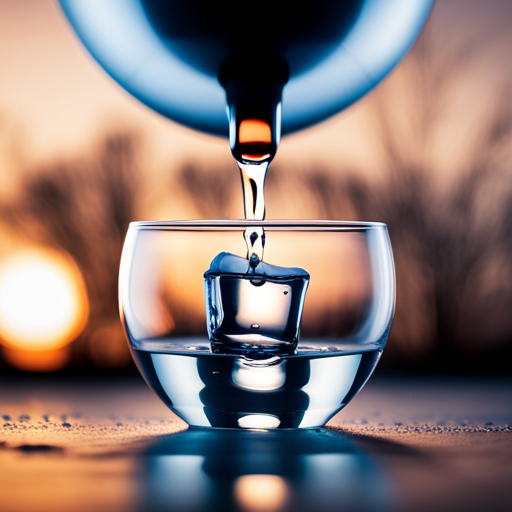Do you love a cold glass of water with perfectly shaped ice cubes? If you have a refrigerator with an ice maker, it’s essential to know whether or not it has a filter.
Without a filter, the impurities and debris in your water can affect the taste and quality of your ice. But don’t worry, with the help of an ice maker filter, you can enjoy cleaner and better-tasting ice.
An ice maker filter works to remove impurities such as chlorine, sediment, and other contaminants from your water supply. It ensures that your ice is not only refreshing but also safe to consume.
In this article, we’ll explore the importance of ice maker filters, the types of filters available, and how to maintain and replace your filter for optimal performance. So, sit back, relax, and learn how a small filter can make a big difference in the quality of your ice.
Key Takeaways
– Ice maker filters are important for clean and better-tasting ice.
– In-line and internal filters are common types for ice maker systems and both are equally effective in removing contaminants and impurities.
– Filters should be replaced every 6 to 9 months for maximum efficiency and regular maintenance and replacement is necessary for proper functioning.
– Filtered ice is clearer and tastes better than unfiltered ice, and impurities and debris in water can affect ice taste and quality.
Importance of Ice Filters
If you want cleaner, better-tasting ice, you need a filter for your refrigerator’s ice maker. The benefits of having a filter are immense. Filters eliminate debris and ensure clean water, which greatly improves the taste and quality of your ice.
Without a filter, impurities in the water can affect the ice’s taste, making it unpalatable. Additionally, debris can clog the ice maker, causing it to malfunction or produce less ice.
Modern refrigerators with built-in water and ice dispensers may not all have built-in filters for the ice makers. Comparing the ice from a filtered system to one without a filter shows a noticeable difference. Ice from a filtered system is clearer and tastes better, whereas ice from an unfiltered system may have impurities or a strange taste.
You can add an in-line filtration system to your ice-making system, even if your refrigerator does not have a built-in filter. Therefore, investing in an ice maker filter should be a priority if you want to enjoy clean and delicious ice.
Types of Filters
You can choose from several different types of filtration systems to add to your refrigerator’s ice making system. The most common types of filters are in-line filters and internal filters. In-line filters are installed outside the refrigerator and are connected to the water supply line that feeds the refrigerator. Internal filters, on the other hand, are built into the refrigerator and are located either in the base grille or in the top right corner of the inside of the refrigerator.
When it comes to filter effectiveness, both types are equally effective in removing contaminants and impurities from the water. However, in-line filters may be more effective in reducing the presence of odors and unpleasant tastes in the water due to their larger surface area. Additionally, in-line filters may be easier to replace and maintain since they can be accessed without having to move the refrigerator. Ultimately, the choice of which type of filter to use will depend on personal preference and the specific installation options available in your home.
| Filter Type | Location | Installation |
|---|---|---|
| In-line filter | Outside the refrigerator | Connected to the water supply line that feeds the refrigerator |
| Internal filter | Built into the refrigerator | Located either in the base grille or in the top right corner of the inside of the refrigerator |
Maintenance and Replacement
To keep your refrigerator’s water filtration system functioning properly, regular maintenance and replacement of the filter is necessary. Here are some tips to help you properly maintain and replace your ice maker filter:
– Check the manufacturer’s instructions for the recommended filter lifespan. Generally, filters should be replaced every 6 to 9 months to ensure maximum filtration efficiency.
– If you notice a decrease in ice production or a change in the taste or odor of your ice, it may be time to replace the filter.
– When replacing the filter, be prepared for the initial ice to have black specs from the carbon in the filter. This is normal and will dissipate after the first few batches of ice.
– After replacing the filter, it can take anywhere from 6 to 12 hours for the ice maker to begin making ice normally again. Be patient and allow the system to properly flush and adjust.
– If you continue to experience issues after replacing the filter, try flushing the filter with water to remove any air bubbles or debris that may be causing a blockage.
By following these simple maintenance and replacement tips, you can ensure that your ice maker filter is functioning properly and providing you with clean and refreshing ice. Remember to always refer to your manufacturer’s instructions for specific details on your particular model.
Conclusion
Now that you understand the importance of ice maker filters, it’s time to take action. Make sure to check if your refrigerator has a filter for the ice maker and if it does, schedule regular maintenance and replacement to ensure optimal performance.
Remember, a clean filter means cleaner ice, better taste, and overall peace of mind knowing that you’re consuming safe and refreshing ice. Investing in a high-quality ice maker filter is a small but significant way to improve the taste and quality of your ice.
With proper maintenance and replacement, you can enjoy fresh and clean ice all year round. So, take the necessary steps to ensure your ice maker filter is working properly and enjoy a cold and refreshing drink without any worries.




